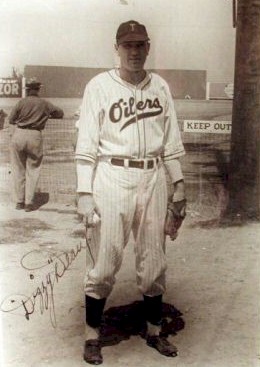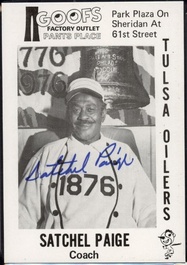Non-partisan elections: Can't tell the players
In this week's Urban Tulsa Weekly, Ray Pearcey deploys an apt analogy against the Save Our Tulsa non-partisan election proposition on Tulsa's general election ballot this Tuesday.
If you are a baseball fan you've had time to recover from late night World Series games, so I want you to imagine a very different kind of baseball game. You see, in this variation, the teams don't have uniforms and the players wear street clothes, so it's impossible to see who's on what team. There are lots of very confused folks in the stands -- in fact many people simply go home shortly after the game gets underway, other fans, having been told about the no uniform rules, simply stay home not wanting to waste their time with a confusing contest.But there are a handful of people at the game who are yelling and clapping, these folks have inside info, maybe they know the players first hand, maybe the players are their kin or maybe the insiders are owners. The thing is, only a tiny set of people at the game know the players and their team affinities: that is what non-partisan elections will "look like" in Tulsa.
Pearcey points out that our current non-partisan elections for district judge are plagued with low turnouts and voter confusion. Non-partisan races are likely to hinge on name recognition, which in turn is driven by which candidate has the biggest budget:
Big print ads, sizable radio and TV runs will be paramount in "non-par" contests: council candidates will need big bucks to prevail in this newly chaotic, information spare environment. Expect the prospects of candidates with strong ties to banking, real estate, construction and big business to get a big boost: these folks should have some influence by right, but shouldn't be allowed to call all the shots.
 That's likely why Save Our Tulsa supports non-partisan elections. Every one of their three ballot propositions -- at-large (citywide) city councilors, city elections at the same time as state and federal elections, and non-partisan elections -- is designed to raise the cost of running a successful race for city council, hampering the chances of a grassroots, door-to-door campaign from succeeding, resulting in a City Council entirely dependent on and subservient to the Money Belt.
That's likely why Save Our Tulsa supports non-partisan elections. Every one of their three ballot propositions -- at-large (citywide) city councilors, city elections at the same time as state and federal elections, and non-partisan elections -- is designed to raise the cost of running a successful race for city council, hampering the chances of a grassroots, door-to-door campaign from succeeding, resulting in a City Council entirely dependent on and subservient to the Money Belt.
Pearcey acknowledges that national party affiliation is an imperfect indicator in local elections, but, he says, "some info is better than zero."
To extend the metaphor, the problem we have right now is that the players are wearing uniforms, but the uniforms don't indicate their loyalties. Imagine a World Series where individual Cardinals and Rangers play not for their own team's victory but for the victory of someone's fantasy league team. Imagine Rangers catcher Mike Napoli tipping Cardinals slugger Albert Pujols to his signals to the pitcher, because they both happen to be on George Kaiser's Rotisserie League lineup, and Rangers pitcher Alexi Ogande is on the FOP's roster. The fans in the stands think the competition is Rangers vs. Cardinals; only the insiders are hip to the teams that really matter and which player is assigned to which team.
Pearcey would like to see the emergence of purely local political parties. That's something you see in Britain and in a few cities around the U. S. where city ballot laws permit it. I've advocated this idea, to be used in conjunction with instant-runoff ballots under the name "multi-partisan elections." The idea won the support of some members of the Citizens' Commission on City Government.
 In the United Kingdom, the Electoral Commission maintains a register of national and local political parties. A party registers its name, a logo, and a description which appear next to the candidate's name on the ballot. The Electoral Commission has rules to reject names confusingly similar to existing parties. Each candidate files as a party nominee (with the party's authorization) or as an independent. At some elections, the candidate must post a deposit which will be refunded if he wins the seat or gets some nominal percentage of the vote. (Candidates for parliament post a £500 deposit, refunded if they receive at least 5%.)
In the United Kingdom, the Electoral Commission maintains a register of national and local political parties. A party registers its name, a logo, and a description which appear next to the candidate's name on the ballot. The Electoral Commission has rules to reject names confusingly similar to existing parties. Each candidate files as a party nominee (with the party's authorization) or as an independent. At some elections, the candidate must post a deposit which will be refunded if he wins the seat or gets some nominal percentage of the vote. (Candidates for parliament post a £500 deposit, refunded if they receive at least 5%.)
In Minneapolis, for example, candidates declare a three-word "political party or principle" that appears next to their name on the ballot. (Here are filings from the 2009 Minneapolis election, with the designations chosen by the candidates, and here are the 2009 Minneapolis election results.) Most candidates chose a national label, and in some districts, two or more candidates with the same party label were on the ballot. Minneapolis uses ranked-choice voting, a form of Instant Runoff Voting, so all candidates appear on the general election ballot, and voters indicate first, second, and third choices. If no candidate receives a majority of first-choice votes, the low-ranked candidate is eliminated and his votes redistributed based on the second choice marked on those ballots.
The beauty of the Minneapolis approach is that it lets every voter choose from among all the candidates, without obscuring real differences between the candidates, and yet it ensures that the winner has the support of a majority of the voters. Unfortunately these approaches to "multi-partisan voting" aren't on the ballot this Tuesday.
The Save Our Tulsa non-partisan proposition is a move by wealthy old midtowners to strengthen their faltering grip on Tulsa's city government, and it should be rejected. On Tuesday vote AGAINST all three initiative petition propositions on the right side of the ballot.
MORE: The Tulsa Whirled editorial board ridiculed (but didn't provide a substantive argument against) my multi-partisan idea back in 2007. In reply, I explained how a strictly non-partisan ballot would boost their influence in electing Money Belt toadies at the expense of grassroots candidates:
They oppose it for selfish reasons which they don't wish to reveal to the reader. A candidate's brief self-description on the ballot constitutes a media bypass. Without depending on the favor of the monopoly daily newspaper, without needing a pile of campaign cash, a candidate would be able to communicate something about himself, albeit very briefly, to every voter, in words of his own choosing.If the Whirled editorial hive-mind gets its collective way, a city election ballot would comprise lists of bare names, with no other identifying information. As the still-dominant media outlet in Tulsa, the Whirled would define for many voters what emotions and opinions they should hold about each of those names.
Small wonder they don't like the idea.
0 TrackBacks
Listed below are links to blogs that reference this entry: Non-partisan elections: Can't tell the players.
TrackBack URL for this entry: https://www.batesline.com/cgi-bin/mt/mt-tb.cgi/6224